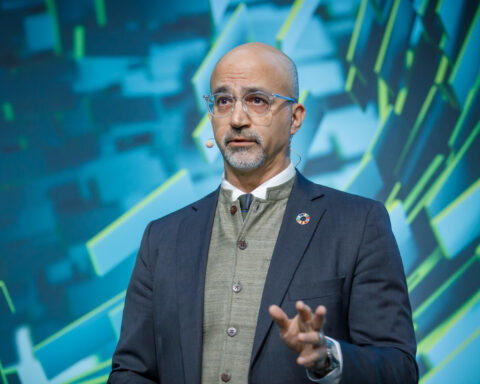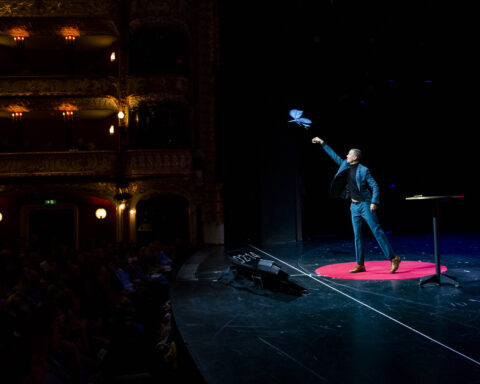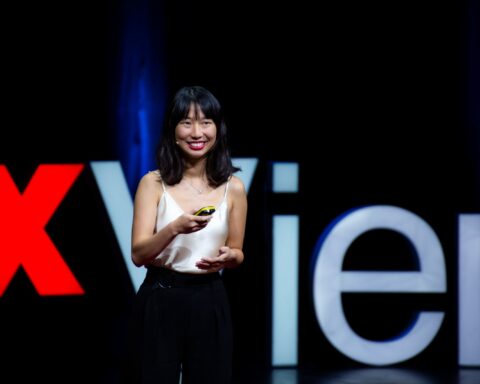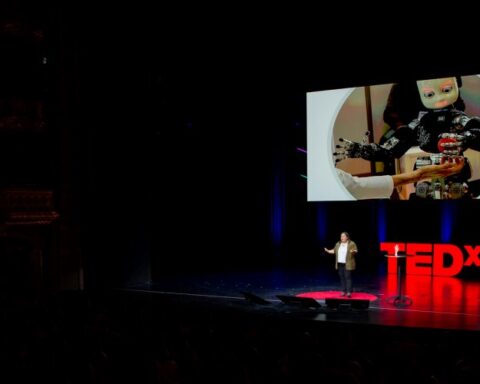When I wrote about the controversial topic of surrogacy and the ethical and legal issues it comes with, I never thought that the article would put me in contact with someone who is a “product” of reproductive technology, albeit not surrogacy per se. Shortly before turning 30, Albert Frantz found out that he was the product of reproductive technology himself, and that discovery took him on a quest to find his missing family, and with them his own true identity. In 2015, he spoke at TEDxSanFrancisco on identity as a human right and the impact of reproductive technology on identity, which was the first TEDx talk on the subject by a so-called donor-conceived person.
Last week, I had the pleasure to interview him and discuss the immense ethical, legal, and psychological issues that come with reproductive technology and its impacts on identity.
Here is the interview:
Please tell us a bit about yourself.
My name is Albert, I’m a pianist, a piano teacher, and speaker, and I’ve become an activist in the area of reproductive technology in recent years because I discovered well into my adult life that that’s how I came into this world. There really is a lot that I think needs to be changed about the industry and practice. And now is a time when we really need to listen to the population that is by far, most affected by this industry—the people the industry actually creates. And unfortunately, it’s only very recently that our voices are even getting heard. I think efforts such as yours are extremely welcome and very necessary.
Yes, this way more people can be in the know. While this is a difficult topic to talk about, it is important to talk about it because, as you have mentioned in several talks, it is a serious human rights issue, so we need to discuss it.
I think that’s a great starting point. Human rights are not all equal. And unfortunately, human rights often do come into conflict. Reproductive technology is one area in which they do. One of them is the right to privacy. So if a donor donates the sperm or eggs, then that person might believe that they have a right to privacy. And they might even have a contract with the so-called intended parents or with a fertility clinic. But that supposed right to privacy conflicts directly with their offspring’s right to identity, which I think is a far more fundamental right. So, number one, the offspring were never part of any privacy agreement. They just decided to create us. We didn’t sign that contract. We didn’t sign that agreement.
But then in terms of which rights should be given priority when rights do come into conflict, I am unable to think of any right that could be more fundamental to being human beyond the basic right to life and what that implies. What could possibly be more fundamental to being human than the right to our own identity or the right to actually knowing who we are? That is a right that actually is recognized and presumably protected by the United Nations Convention on the Rights of the Child. But fundamentally, we don’t want an identity just assigned to us. We want our identity. We want to know who we are. And that implies that we need to know exactly which two human beings we are made from.
You mentioned in your TED Talk in San Francisco that after learning about being donor-conceived, you felt “you’ve been lied to your whole life about who you are” and you also experienced an “identity crisis”. How did that revelation affect your own sense of identity and how did you deal with those feelings?
What’s interesting is that I gave that talk in 2015 and it’s now four and a half years later. And at the time there wasn’t this community, specifically of donor-conceived adults that we have now. And I felt like I was an alien, like in a vacuum. But I think it’s important to point out that this feeling of not belonging, like something isn’t right, something doesn’t add up – that didn’t suddenly occur the moment I discovered I was donor-conceived, which was shortly before I turned 30. That was something that had been with me for my entire life. There’s this feeling of just being alien.
We like to pretend that human beings are tabula rasa, that babies are just blank slates. And then everybody comes into this world totally empty, totally blank. And then it’s up to whatever parents are raising the child, then they’re going to fill in those blanks. But we’ve learned over the past few decades, thanks to any number of separated twin and adoptee studies, that we are not blank slates. That is absolutely not the case. So there’s this conflict or dichotomy between nature and nurture. In reality, those two things are not supposed to be in conflict.
I strongly oppose any notion that biological parents are unimportant. There’s a certain level of delusion in the industry that it promotes, that, “Oh, it’s just sperm, eggs, whatever”. On the one hand, they say it doesn’t matter because the parents are raising that child, or they’re just going to shape the child into whatever they want. Which is not true. But then, on the other hand, the fertility industry sells eugenics. So, if you want someone who’s the genetic child of an Ivy League graduate or somebody who has a particular athletic or musical talent, or somebody who’s a model or whatever, then they cost a lot extra.
This is a direct contradiction within the industry. They profit from eugenics by selling “premium” sperm and eggs. And yet, they also say, “Oh, but the genetic parents don’t matter at all. And they definitely won’t matter to your child because it’s totally YOUR child”. Recipient parents are often incredibly protective: “Oh, the donor is just a donor – he/she’s not a parent in any way whatsoever.” But the unavoidable truth is, those parents are raising that man’s or that woman’s child and nothing can change that genetically.
What could possibly resolve these conflicts? What would be just, what would truly be fair? I think for people who were born via reproductive technology, both social and biological parents need to be fully recognized from the very beginning. So we need to understand that people like me effectively have three parents: the two parents I grew up with, one of whom was my biological mother, but also a biological father. And not actually erase that person. I was never supposed to know that my own father exists. I mean, that is not in any way just.
You already mentioned some of the reasons, but are there any other reasons why you think it is important for donor-conceived people or anyone who is conceived with the help of reproductive technology, to have the right to know their biological parent(s) and the right to know their own identities and where they come from?
Absolutely, I think it’s important. The easy answer is that it’s important for health reasons, right? In bioethics, this aspect is discussed pretty frequently, but it goes far, far deeper than that. It’s not just your physical health. Now you have to understand, I’m in my mid-forties and in my generation, so-called third-party reproduction involved a sperm donor. This was, I believe, only available in the US at the time to heterosexual couples. And there was a lot of shame involved. So, they’re dealing with infertility and the idea was to hide it. “Don’t worry, your child will never know”- but something that is so common among donor-conceived people is that even when you don’t know, you know. So I grew up knowing on some level.
Is there a feeling that something is missing?
Oh, absolutely. Like, if you’re feeling like an alien, having totally different interests, totally different values, thinking in a totally different way. And then not knowing where that comes from.
You’re one of the lucky ones because there are so many who don’t even know that they’re donor-conceived. What is it like having to search for your missing family and identity?
The very fact that I had a need to search for the missing family meant that there was something very important missing. It’s human nature to know or to want to know, and it’s not just knowing the identity of that person, it’s actually knowing that person. I live in a country where there is no donor anonymity. Austria was one of the first countries to abolish donor anonymity. In fact, when a child turns 13 here, a child who was donor-conceived, they have the right to find out the identity of the donor. So I think Austria is much further ahead than many countries, but 13 is already, I think, pretty late, for starters.
And also, I think many of us do want whatever relationship can come about. We want a natural relationship with our natural parents and that doesn’t exclude a relationship with the parents whom we’re not genetically related to. But many of us do crave that relationship because, without it, something deep is missing emotionally and psychologically.

Let’s talk about the (un)ethical issues of the fertility industry. While there are several guidelines by independent organizations all over the world, in the United States and many other countries there is no legal regulation when it comes to reporting requirements of donor-conceived children or any regulations regarding limitations on the number of children per donor. What are some of the (legal) changes that need to be made in the fertility industry to tackle these human rights issues?
Well, since you mentioned the number of children per donor, that’s an incredibly important issue, particularly for sperm donors. I know people who have hundreds of siblings. That’s weird. I think there’s something wrong with that. It needs to be strictly limited.
We also need to change the terminology. We cannot simply refer to so-called donors as donors. I call that the “donor misnomer,” because in most cases, according to surveys of both sperm and egg donors, their primary reason they do it is for the money. Again, this is another area in which Austria is ahead of other countries because Austria doesn’t allow commercial donation, but many countries do, like the US where the money is the primary reason.
I think that the monetary aspect of the reproductive fertility industry needs to be abolished entirely. So for starters, some of the reforms that we need are full, open identity, and actually knowing the so-called donor from the very beginning, totally eliminating the financial compensation as any kind of motive and limiting the number of offspring for the donor to, let’s say an absolute maximum of 10. That’s one of the issues that needs to be changed.
And I think that we also need to change the vocabulary and fully recognize biological parents as parents. Even if they’re not legal parents, they still need to be recognized as parents. Imagine if they knew their children and their children knew them from the very beginning. Maybe it’s not like a mom or dad relationship, maybe it’s a little bit different, but if it were understood that they are part of the family, then so-called donors wouldn’t have hundreds of children.
What about the ethical, legal, and social implications of eugenics, selective breeding, and making “designer” babies? Can you please share your point of view regarding these issues?
That’s a selling point and this is yet another ethical can of worms. Ethically, we’re on very rocky ground with this question. If there are rich adults who can commission a child made from certain ingredients that they can just pay for, I think ethically that leaves an awful lot to be desired.
Do you have anything else to add or any advice to people from your own community who are still dealing with an identity crisis and looking for their biological parent(s)?
More and more people are finding this out every single day, thanks to consumer DNA tests. I think that’s a really good thing. The later we find out, the worse the outcome is, and actually there’s a direct analogy to adoptees. There’s a lot that we can learn in the fertility world and the donor conception world from the adoption community because they’ve been at this for much longer. Around the world, adoptees have gradually gotten their rights recognized, often with lengthy court battles and a lot of heartache and a lot of expense, monetarily, psychologically, and emotionally.
There was a study that came out a year or so ago on so-called “late-disclosure” adoptees having significantly worse lifetime outcomes in well-being, happiness, and psychological health. The later they found out, the worse everything was. And do you know what “late disclosure” meant? According to this study, anything older than the age of two. So children who were three years old or older, who learned that they were adopted, they go on to have measurably worse outcomes in all these important areas of psychological well-being, like emotional health or mental health, because they learned that they were adopted at age three. If you tell a child by the age of two, then they’re okay, but already by three, that’s considered late disclosure.
And yet, what we have now proposed in the fertility world is this disclosure. In some cases, if we’re lucky, the donor’s identity is disclosed when the offspring turns 18, so once the child becomes an adult. Here in Austria, it’s once the child turns 13 -well, that’s already really late. So if this practice is going to exist ethically, we need to know about this from day one, from the very, very beginning. And I think the only thing that would be fair would be to have an open-source identity and to know – fully know – all of one’s biological parents from day one, for them to grow up knowing one another, not just knowing there’s a mystery man or a mystery woman out there on paper, but actually knowing that person.
As for your question about any advice to people who discovered that they’re donor-conceived, fortunately, now there are groups out there. The biggest group that I would recommend is called We Are Donor Conceived. The other thing is that the emotions surrounding it have changed. There are people who will say, okay, I am donor-conceived, no big deal, I’m fine, whatever. But it doesn’t mean it’s always going to be like that. Maybe if you’re lucky, that’s great. But it’s a really, really complex thing. We are dealing with the absolute core of what it is to be a human being, identity. Nothing could be more personal than that.
And when your identity is suddenly shattered and you discover that literally you are not who you say you are… that does something. That’s a really big deal.
About Albert Frantz

Albert Frantz began piano studies at the unusual age of 17 after a childhood teacher proclaimed he would never be able to play the piano. A graduate of Penn State University, he won local, state, and national piano competitions and became the first pianist to be awarded a Fulbright Fellowship to Vienna in nearly a decade. Albert records for the Gramola label and is a Bösendorfer Artist. His first CD, of works by Romantic composer Charles-Valentin Alkan, was an official jury nomination for the German Record Critics’ Award, established to set the “most rigorous standards for supreme achievement and quality” in the field of music recording. His most recent album is Liszt’s complete Transcendental Etudes.
Albert is also a passionate amateur Ironman triathlete and is among the most frequent contributors to the TEDx platform. A documentary about his life and work was released by dreama.tv in 2015. In October 2016, Albert was the cover story for Toastmaster Magazine, the official print publication of Toastmasters International, the world’s largest organization for leadership and communication training in over 140 countries. He served as Head of Mission, Austria for the global think tank Diplomatic Council and continues to advocate for issues of children’s rights around the world. As a keynote speaker and activist, Albert has spoken at venues ranging from Vienna’s City Hall to the United Nations in Geneva.
Want to help?
Please show your support for ethical donor conception and surrogacy by signing this petition:
Making Humans: International Principles for Donor Conception and Surrogacy
In the meantime, check out one of Albert Frantz’s TEDx Talks:
Header Image by Ouriel Morgensztern
All Photos: Courtesy of Albert Frantz





